Configure Zscaler ZSCloud for automatic user provisioning
In this article, you'll learn how to configure Microsoft Entra ID to automatically provision and deprovision users and/or groups to Zscaler ZSCloud.
Note
This article describes a connector that's built on the Microsoft Entra user provisioning service. For important details on what this service does and how it works, and answers to frequently asked questions, see Automate user provisioning and deprovisioning to SaaS applications with Microsoft Entra ID.
Prerequisites
To complete the steps outlined in this article, you need the following:
- A Microsoft Entra tenant.
- A Zscaler ZSCloud tenant.
- A user account in Zscaler ZSCloud with admin permissions.
Note
The Microsoft Entra provisioning integration relies on the Zscaler ZSCloud SCIM API, which is available for Enterprise accounts.
Add Zscaler ZSCloud from the gallery
Before you configure Zscaler ZSCloud for automatic user provisioning with Microsoft Entra ID, you need to add Zscaler ZSCloud from the Microsoft Entra application gallery to your list of managed SaaS applications.
Sign in to the Microsoft Entra admin center as at least a Cloud Application Administrator.
Browse to Identity > Applications > Enterprise applications > New application.
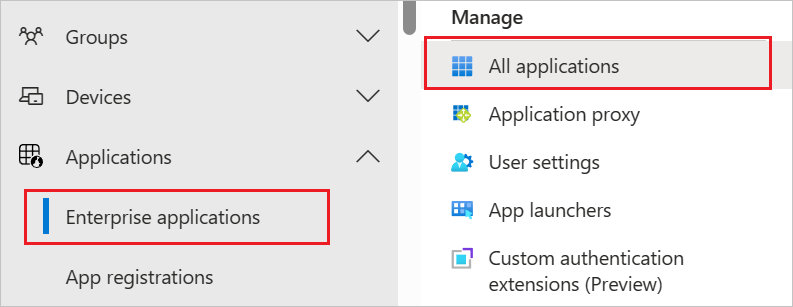
In the search box, enter Zscaler ZSCloud.
Select Zscaler ZSCloud in the results and then select Add.
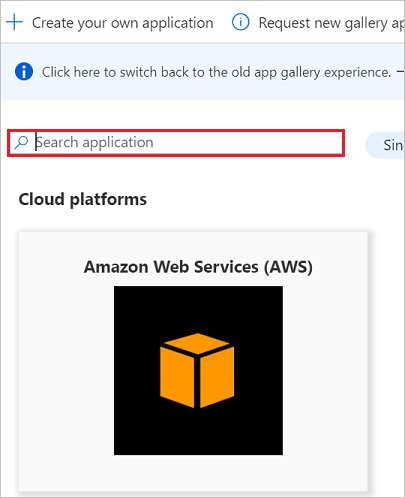
Assign users to Zscaler ZSCloud
Microsoft Entra users need to be assigned access to selected apps before they can use them. In the context of automatic user provisioning, only the users or groups that are assigned to an application in Microsoft Entra ID are synchronized.
Before you configure and enable automatic user provisioning, you should decide which users and/or groups in Microsoft Entra ID need access to Zscaler ZSCloud. After you decide that, you can assign these users and groups to Zscaler ZSCloud by following the instructions in Assign a user or group to an enterprise app.
Important tips for assigning users to Zscaler ZSCloud
We recommend that you first assign a single Microsoft Entra user to Zscaler ZSCloud to test the automatic user provisioning configuration. You can assign more users and groups later.
When you assign a user to Zscaler ZSCloud, you need to select any valid application-specific role (if available) in the assignment dialog box. Users with the Default Access role are excluded from provisioning.
Set up automatic user provisioning
This section guides you through the steps for configuring the Microsoft Entra provisioning service to create, update, and disable users and groups in Zscaler ZSCloud based on user and group assignments in Microsoft Entra ID.
Tip
You might also want to enable SAML-based single sign-on for Zscaler ZSCloud. If you do, follow the instructions in the Zscaler ZSCloud single sign-on article. Single sign-on can be configured independently of automatic user provisioning, but the two features complement each other.
Note
When users and groups are provisioned or de-provisioned we recommend to periodically restart provisioning to ensure that group memberships are properly updated. Doing a restart will force our service to re-evaluate all the groups and update the memberships.
Sign in to the Microsoft Entra admin center as at least a Cloud Application Administrator.
Browse to Identity > Applications > Enterprise applications > Zscaler ZSCloud.
Select the Provisioning tab:
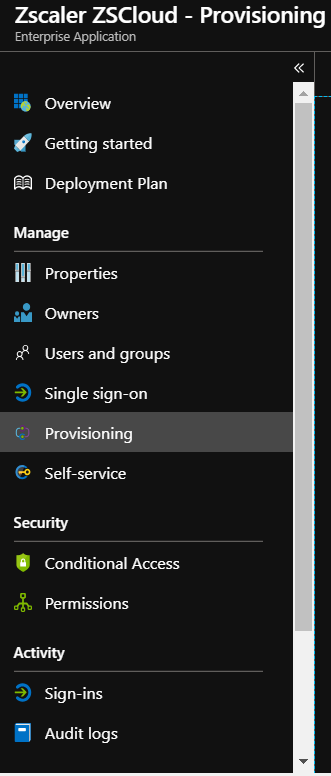
Set the Provisioning Mode to Automatic:

In the Admin Credentials section, enter the Tenant URL and Secret Token of your Zscaler ZSCloud account, as described in the next step.
To get the Tenant URL and Secret Token, go to Administration > Authentication Settings in the Zscaler ZSCloud portal and select SAML under Authentication Type:
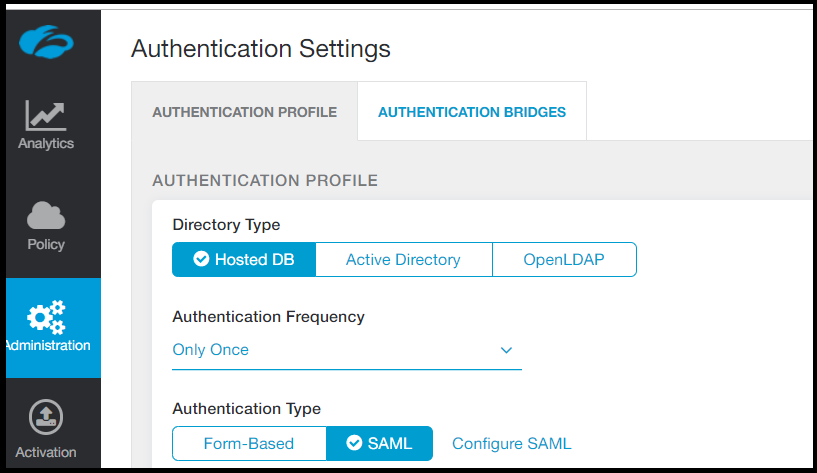
Select Configure SAML to open the Configure SAML window:
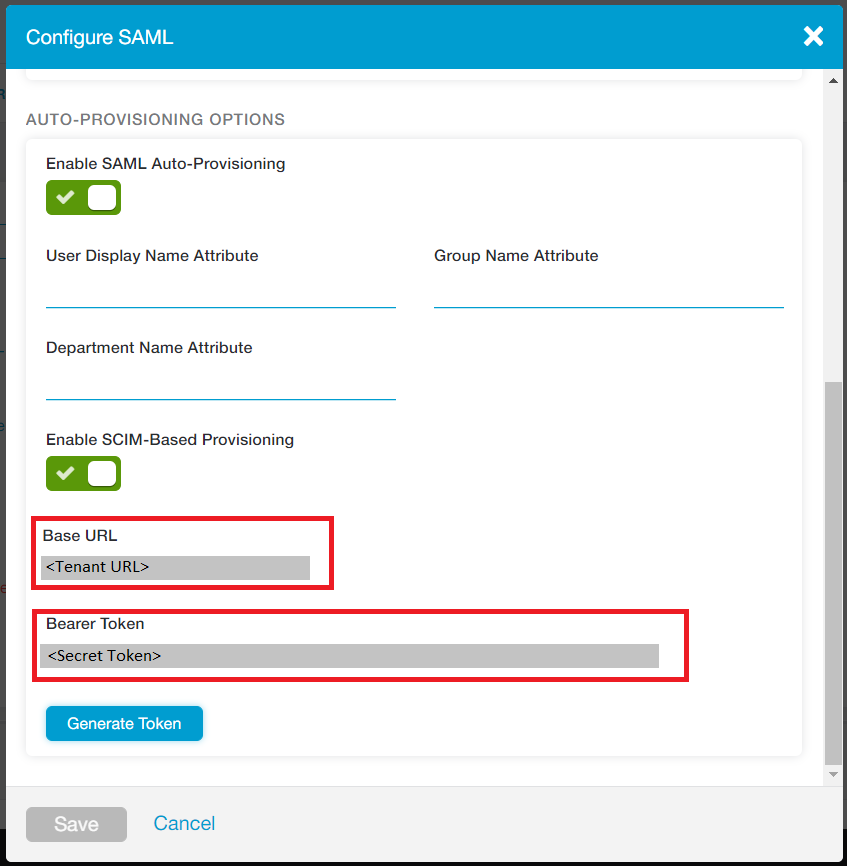
Select Enable SCIM-Based Provisioning and copy the Base URL and Bearer Token, and then save the settings. In the Azure portal, paste the Base URL into the Tenant URL box and the Bearer Token into the Secret Token box.
After you enter the values in the Tenant URL and Secret Token boxes, select Test Connection to make sure Microsoft Entra ID can connect to Zscaler ZSCloud. If the connection fails, make sure your Zscaler ZSCloud account has admin permissions and try again.

In the Notification Email box, enter the email address of a person or group that should receive the provisioning error notifications. Select Send an email notification when a failure occurs:

Select Save.
In the Mappings section, select Synchronize Microsoft Entra users to Zscaler ZSCloud.
Review the user attributes that are synchronized from Microsoft Entra ID to Zscaler ZSCloud in the Attribute Mappings section. The attributes selected as Matching properties are used to match the user accounts in Zscaler ZSCloud for update operations. Select Save to commit any changes.
Attribute Type Supported for filtering Required by Zscaler ZSCloud userName String ✓ ✓ externalId String ✓ active Boolean ✓ name.givenName String name.familyName String displayName String ✓ urn:ietf:params:scim:schemas:extension:enterprise:2.0:User:department String ✓ In the Mappings section, select Synchronize Microsoft Entra groups to Zscaler ZSCloud.
Review the group attributes that are synchronized from Microsoft Entra ID to Zscaler ZSCloud in the Attribute Mappings section. The attributes selected as Matching properties are used to match the groups in Zscaler ZSCloud for update operations. Select Save to commit any changes.
Attribute Type Supported for filtering Required by Zscaler ZSCloud displayName String ✓ ✓ members Reference externalId String ✓) To configure scoping filters, refer to the instructions in the Scoping filter article.
To enable the Microsoft Entra provisioning service for Zscaler ZSCloud, change the Provisioning Status to On in the Settings section:

Define the users and/or groups that you want to provision to Zscaler ZSCloud by choosing the values you want under Scope in the Settings section:

When you're ready to provision, select Save:

This operation starts the initial synchronization of all users and groups defined under Scope in the Settings section. The initial sync takes longer than subsequent syncs, which occur about every 40 minutes, as long as the Microsoft Entra provisioning service is running. You can monitor progress in the Synchronization Details section. You can also follow links to a provisioning activity report, which describes all actions performed by the Microsoft Entra provisioning service on Zscaler ZSCloud.
For information on how to read the Microsoft Entra provisioning logs, see Reporting on automatic user account provisioning.
Additional resources
- Managing user account provisioning for enterprise apps
- What is application access and single sign-on with Microsoft Entra ID?